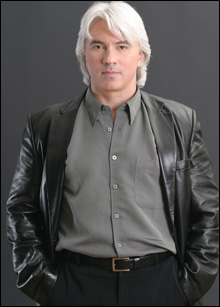|

FILLING JORDAN HALL: Belshazzar didn’t, Hvorostovsky did.
|
The classical-music season is winding up without winding down. So many notable events have been taking place, you’d think we had months to go before summer-festival time. Pianist Russell Sherman’s complete Mozart sonata series at Emmanuel Church, for example, was intended, he said, “not to define Mozart, but to see the splendors of his universe.” Splendors abounded at the last concert — maybe my favorite of the ones I attended. Sherman began and ended with sonatas in C major — the brilliant and sophisticated K.330 (Mozart at 22) and the famous “musical snuff box,” K.545 (Mozart at 32 — already a late work), of which Emmanuel Music director Craig Smith wrote, “You have to be very young, or old and wise to bring it off.” Sherman’s forward-leaning asymmetrical phrasing, even in this most symmetrical of sonatas; the way Mozart’s decorative effects always spin out of, and return to, the musical line; the exposure of shadowy inner harmonies — all these were present in the most exploratory and compelling version of this “simple” sonata I’ve ever heard.
Sherman was joined by some of Emmanuel’s most remarkable alums — Peggy Pearson (oboe), Bruce Creditor (clarinet), Neil DeLand (horn), and Thomas Stephenson (bassoon) — for Mozart’s E-flat Quintet for Piano and Winds (K. 482), a work that, in its overlapping of individual voices and timbres, reminds me of the heartbreaking operatic ensembles of Le nozze di
Figaro and Cosí fan tutte, the exquisite elegance of Mozart’s serenades, and the deep poignance of his most serious chamber music.
The evening — and the series — ended with Sherman’s only encore (he called it an “anti-encore”): Ferruccio Busoni’s transcription of the stormy, melancholy Andantino of Mozart’s first great piano concerto, No. 9 in E-flat, K.271, which the great master dedicated to his student Eduard Steuermann, Russell Sherman’s great teacher.
Several of the players in the quintet were also in the Cantata Singers orchestra for an ambitious season closer, Handel’s Belshazzar — a Cinemascopic oratorio dealing with the fall of Baghdad, capital of an ancient empire devoured by its own corruption, and a foolish ruler who confuses religion with morality. David Hoose and the Cantata Singers did it 17 years ago, but this time the political implications were even more immediate and inescapable. Hoose led it, the orchestra played it, and the astonishing chorus sang it, vividly distinguishing among frivolous Babylonians (“‘tis religion to be drunk”), heroic Persians, and lamenting captive Hebrews, with seething conviction.
Tenor William Hite, in firm, ringing voice, was the spoiled, self-absorbed rich-boy ruler Belshazzar. Countertenor Jeffrey Gall, his wise and cagy adversary, the Persian king Cyrus, sounded every bit as heroic and brilliant as he did when he sang the same role with Hoose in 1989, or seven years earlier than that with Donald Teeters and the Boston Cecilia. Soprano Karyl Ryczek, a Cantata Singers stalwart who sounded better than ever as Mary Magdalene in John Harbison’s But Mary Stood, continued impressively as Nitocris, Belshazzar’s despairing mother, who opens the oratorio with librettist Charles Jennens’s prescient monologue about the inevitable cycles of empire (“Arriv’d to full maturity, it grasps/At all within its reach, o’erleaps all bounds,/Robs, ravages, and wasts the frighted world./At length grown old and swell’d to bulk enormous”). Ryczek could afford to add a few more consonants to her repertoire. Baritone David Kravitz at first overplayed the role of Cyrus’s collaborator Gobryas, but eventually he settled his increasingly large voice into his customary refinement and eloquence.
Mezzo-soprano Pamela Dellal was Daniel, the voice of spiritual authority. It was a striking gesture to have her remain seated on a central platform rather than entering and leaving with the other soloists. At the epicenter of this more than three-hour work, Daniel deciphers for the terrified Belshazzar the “Mene, mene, tekel, upharsin” handwriting on the wall. It’s one of Handel’s greatest sequences, and Dellal, with mysterious staccato strings depicting the actual writing hand, rose gloriously to the occasion.
Boston is a major world center of Handel performances. Donald Teeters, a pioneer in early-instrument Handel, delivered a wittily incisive pre-concert talk. Esteemed Handel scholar Ellen Harris was in the audience. Peter Sellars’s earliest major professional productions were Handel in Boston; his 1981 Saul, with Craig Smith leading the Cantata Singers, remains a milestone and a touchstone. So Belshazzar was a significant cultural event in this city. It’s bewildering and depressing that the crowd cheering it at Jordan Hall was so sparse. What’s happened to us?
On the other hand, glamorous Russian baritone and Metropolitan Opera star Dmitri Hvorostovsky filled Jordan Hall for a Bank of America Celebrity Series recital with Estonian pianist Ivari Ilja. A lot of Russian speakers were in evidence — maybe including a number of newcomers to classical concerts. Hvorostovsky didn’t seem to mind the applause after each song, applause that interrupted the sets he’d carefully organized and, worse, the dramatic continuity between the parts of Mussorgsky’s Songs and Dances of Death. (Some misplaced applause even preceded — and wrecked — the climax of one song.) A simple finger to his lips might have prevented the inopportune outbursts, but maybe this 44-year-old matinee idol with a killer smile didn’t want to inhibit his adulators.